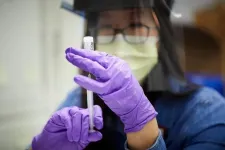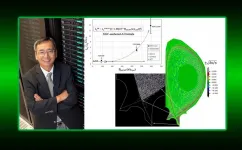(Press-News.org) New research at Washington University School of Medicine in St. Louis indicates that three new, fast-spreading variants of the virus that cause COVID-19 can evade antibodies that work against the original form of the virus that sparked the pandemic. With few exceptions, whether such antibodies were produced in response to vaccination or natural infection, or were purified antibodies intended for use as drugs, the researchers found more antibody is needed to neutralize the new variants.
The findings, from laboratory-based experiments and published March 4 in Nature Medicine, suggest that COVID-19 drugs and vaccines developed thus far may become less effective as the new variants become dominant, as experts say they inevitably will. The researchers looked at variants from South Africa, the United Kingdom and Brazil.
"We're concerned that people whom we'd expect to have a protective level of antibodies because they have had COVID-19 or been vaccinated against it, might not be protected against the new variants," said senior author Michael S. Diamond, MD, PhD, the Herbert S. Gasser Professor of Medicine. "There's wide variation in how much antibody a person produces in response to vaccination or natural infection. Some people produce very high levels, and they would still likely be protected against the new, worrisome variants. But some people, especially older and immunocompromised people, may not make such high levels of antibodies. If the level of antibody needed for protection goes up tenfold, as our data indicate it does, they may not have enough. The concern is that the people who need protection the most are the ones least likely to have it."
The virus that causes COVID-19, known as SARS-CoV-2, uses a protein called spike to latch onto and get inside cells. People infected with SARS-CoV-2 generate the most protective antibodies against the spike protein.
Consequently, spike became the prime target for COVID-19 drug and vaccine developers. The three vaccines authorized by the Food and Drug Administration (FDA) for emergency use in the U.S. -- made by Pfizer/BioNTech, Moderna and Johnson & Johnson -- both target spike. And potent anti-spike antibodies were selected for development into antibody-based drugs for COVID-19.
Viruses are always mutating, but for nearly a year the mutations that arose in SARS-CoV-2 did not threaten this spike-based strategy. Then, this winter, fast-spreading variants were detected in the United Kingdom, South Africa, Brazil and elsewhere. Sparking concern, the new variants all carry multiple mutations in their spike genes, which could lessen the effectiveness of spike-targeted drugs and vaccines now being used to prevent or treat COVID-19. The most worrisome new variants were given the names of B.1.1.7 (from the U.K.), B.1.135 (South Africa) and B.1.1.248, also known as P.1 (Brazil).
To assess whether the new variants could evade antibodies made for the original form of the virus, Diamond and colleagues, including first author Rita E. Chen, a graduate student in Diamond's lab, tested the ability of antibodies to neutralize three virus variants in the laboratory.
The researchers tested the variants against antibodies in the blood of people who had recovered from SARS-CoV-2 infection or were vaccinated with the Pfizer vaccine. They also tested antibodies in the blood of mice, hamsters and monkeys that had been vaccinated with an experimental COVID-19 vaccine, developed at Washington University School of Medicine, that can be given through the nose. The B.1.1.7 (U.K.) variant could be neutralized with similar levels of antibodies as were needed to neutralize the original virus. But the other two variants required from 3.5 to 10 times as much antibody for neutralization.
Then, they tested monoclonal antibodies: mass-produced replicas of individual antibodies that are exceptionally good at neutralizing the original virus. When the researchers tested the new viral variants against a panel of monoclonal antibodies, the results ranged from broadly effective to completely ineffective.
Since each virus variant carried multiple mutations in the spike gene, the researchers created a panel of viruses with single mutations so they could parse out the effect of each mutation. Most of the variation in antibody effectiveness could be attributed to a single amino acid change in the spike protein. This change, called E484K, was found in the B.1.135 (South Africa) and B.1.1.248 (Brazil) variants, but not B.1.1.7 (U.K.). The B.1.135 variant is widespread in South Africa, which may explain why one of the vaccines tested in people was less effective in South Africa than in the U.S., where the variant is still rare, Diamond said.
"We don't exactly know what the consequences of these new variants are going to be yet," said Diamond, also a professor of molecular microbiology and of pathology & immunology. "Antibodies are not the only measure of protection; other elements of the immune system may be able to compensate for increased resistance to antibodies. That's going to be determined over time, epidemiologically, as we see what happens as these variants spread. Will we see reinfections? Will we see vaccines lose efficacy and drug resistance emerge? I hope not. But it's clear that we will need to continually screen antibodies to make sure they're still working as new variants arise and spread and potentially adjust our vaccine and antibody-treatment strategies."
INFORMATION:
The research team also included co-corresponding author Ali Ellebedy, PhD, an assistant professor of pathology & immunology, of medicine, and of molecular microbiology at Washington University; and co-corresponding author Pei-Yong Shi, PhD, and co-first author Xianwen Zhang, PhD, of the University of Texas Medical Branch.
Texas A&M University College of Medicine ressearchers have recently discovered that cytisine -- a smoking cessation drug commonly used in Europe -- reduces the loss of dopamine neurons in females. These findings provide potential evidence for the use of the drug to treat Parkinson's disease or stop its progression in women.
Sara Zarate and Gauri Pandey, graduate students from the lab of Rahul Srinivasan, assistant professor in the Department of Neuroscience & Experimental Therapeutics, are co-first authors of the research. Their findings are published in the Journal of Neurochemistry.
There ...
Plants, fungi, and bacteria produce natural products that function, among other things, as defenses that are deployed against predators and competitors. In medicine, these compounds are used for antibiotics, cancer drugs, and cholesterol reducers. The team working with associate professor Dr. Robin Teufel and Dr. Britta Frensch of the Institute of Biology II of the Faculty of Biology of the University of Freiburg was able, together with researchers from the ETH Zürich in Switzerland, to shed light on the key role of three enzymes that are involved in synthesizing a class of natural products. The researchers are publishing their findings in the latest edition of "Nature Communications."
Actinobacteria produce many natural products, such as those that are ...
Many species might be left vulnerable in the face of climate change, unable to adapt their physiologies to respond to rapid global warming. According to a team of international researchers, species evolve heat tolerance more slowly than cold tolerance, and the level of heat they can adapt to has limits.
In a study published in the Nature Communications, McGill professor Jennifer Sunday and her co-authors wanted to understand how species' thermal limits have evolved. To examine variation across the tree of life, the researchers developed the largest available database compiling thermal tolerances for all types of organisms (GlobTherm database).
The ...
SAN ANTONIO, March 4, 2021 -- People who have had major sinus surgery should consult their ENT doctor before undergoing COVID-19 swab testing, new research indicates.
Likewise, those performing swab testing should ask whether the patient has had extensive sinus or skull base surgery, said END ...
Shark scientists at Georgia Aquarium, Scripps Institution of Oceanography at UC San Diego, and Dalhousie University are challenging the status quo in shark and ray mating research in a new study that looks at biological drivers of multiple paternity in these animals. The results were published March 4 in the journal Molecular Ecology.
Many species of sharks and rays exhibit multiple paternity, where females give birth to a litter of pups that have different fathers. While widely documented in scientific literature, the drivers of this phenomenon are not well understood. However, previous research has cited male aggression as ...
NEW YORK, NY (March 4, 2021)--Inflammatory heart disease is a rare finding among professional athletes with mild or asymptomatic COVID-19 infection, a large-scale study has found.
The study, led by Columbia University Vagelos College of Physicians and Surgeons in collaboration with the major North American sports leagues and their respective players' associations, was published online today in JAMA Cardiology.
Athletes and COVID-19
Studies suggest that approximately 20% of patients hospitalized with severe COVID-19 develop some type of heart damage, but the impact of mild or asymptomatic ...
March 4, 2021 -- COVID?19 has altered the labor market for millions of people, including public health graduates, yet an analysis of job postings for Master's level public health graduates showed that job postings remained at the same levels as before the pandemic, according to a new study at Columbia University Mailman School of Public Health. The findings are published in the International Journal of Health Planning and Management.
"Due to the crucial role of disease prevention in responding to and recovering from the COVID?19 pandemic, assessing the public health workforce remains critically important," said Heather Krasna, MS, EdM, assistant dean of career services at Columbia Mailman School, and lead author of the study. "Fortunately, the job market for master's ...
PHILADELPHIA (March 4, 2021) - Equitable implementation of COVID?19 vaccine delivery is a national and global priority, with a strong focus on reducing existing disparities and not creating new disparities. But while a framework has been recognized for equitable allocation of COVID?19 vaccine that acknowledges the rights and interests of sexual and gender minorities (SGM), it fails to identify strategies or data to achieve that goal.
A new study with support from researchers at the University of Pennsylvania School of Nursing (Penn Nursing) examined the prevalence ...
There is no stronger risk factor for cancer than age. At the time of diagnosis, the median age of patients across all cancers is 66. That moment, however, is the culmination of years of clandestine tumor growth, and the answer to an important question has thus far remained elusive: When does a cancer first arise?
At least in some cases, the original cancer-causing mutation could have appeared as long as 40 years ago, according to a new study by researchers at Harvard Medical School and the Dana-Farber Cancer Institute.
Reconstructing the lineage history of cancer cells in two individuals with a rare blood cancer, the team calculated when the genetic mutation that ...
Efforts to duplicate on Earth the fusion reactions that power the sun and stars for unlimited energy must contend with extreme heat-load density that can damage the doughnut-shaped fusion facilities called tokamaks, the most widely used laboratory facilities that house fusion reactions, and shut them down. These loads flow against the walls of what are called divertor plates that extract waste heat from the tokamaks.
Far larger forecast
But using high-performance computers and artificial intelligence (AI), researchers at the U.S. Department of Energy's (DOE) Princeton Plasma Physics Laboratory (PPPL) have predicted a far larger and less damaging heat-load width for the full-power operation of ITER, the international tokamak under construction in France, than previous estimates ...


